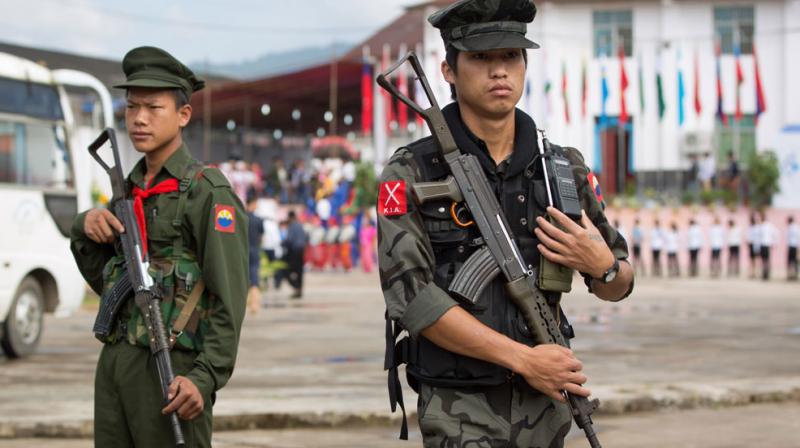Myanmar searches for more Hindu corpses as mass grave unearthed

Yangon: Myanmar troops on Monday searched for dozens of missing Hindu villagers feared dead after the discovery of a nearby mass grave of 28 corpses in Rakhine state, evidence of what the army says is a massacre by Rohingya Muslim militants.
Northern Rakhine was plunged into crisis after Rohingya militants raided police posts last month, unleashing an army crackdown that has displaced hundreds of thousands of civilians.
The vast majority -- more than 430,000 -- are Rohingya Muslims who fled across the border to Bangladesh from a military campaign the UN says likely amounts to ethnic cleansing.
But tens of thousands of ethnic Rakhine Buddhists, and the region's small population of Hindus, have also been internally displaced, saying they were attacked by Rohingya militants.
On Sunday, Myanmar's army said it had discovered two mud pits filled with 28 Hindu corpses, including women and children, outside a village in northern Rakhine.
Hindu villagers from the area told AFP last week Rohingya militants stormed into their communities on August 25, killing many and taking others into the forest.
"The security troops continue searching for remaining Hindu people around the places of the pits," said a statement posted on army chief Min Aung Hlaing's Facebook page.
Displaced Hindus from the area have shown AFP a list of 102 people from two villages who relatives and community leaders fear are dead.
A police officer in northern Rakhine said authorities are trying to verify that figure as they look for more bodies.
"We will continue searching together with villagers," the officer told AFP, requesting anonymity.
With the government blocking access to the conflict zone, it is difficult to verify the maelstrom of accusations.
But the army has steadfastly blamed the Rohingya -- a stateless Muslim minority it has been trying to eject from Myanmar for years.
The focal point of the unrest, northern Rakhine's Maungdaw district, was once home to a fragile mosaic of ethnic groups, dominated by the Rohingya.
Vast swathes of the border region are now completely emptied of Muslims residents, with nearly 40 percent of Rohingya villages abandoned in under a month.
On Sunday the UN's High Commissioner for Refugees called the influx of Rohingya into Bangladesh the "fastest and most urgent refugee emergency in the world".
The vast needs of the hungry, wounded and traumatised Rohingya swarming into Bangladesh have created a separate humanitarian crisis on that side of the border.
But there is little sympathy for the Muslim minority inside Myanmar, where many in the Buddhist majority loathe the group and insist they are foreign invaders.
The Rohingya has faced decades of persecution from a Buddhist nationalist army and discrimination under laws that stripped them of citizenship and restrict their movements.
Analysts say that matrix of repression helped give rise to the the Arakan Rohingya Salvation Army (ARSA), the rag-tag group who plunged the region into crisis with its August 25 attacks.

